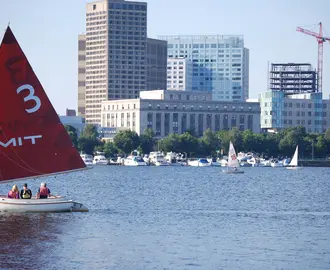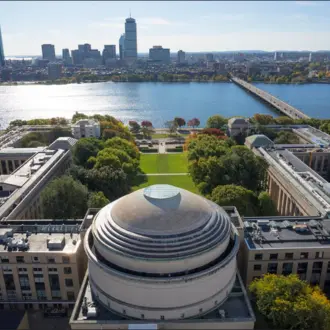As our work lives shrink to the size of laptop screens. As our personal lives contract to the size of a room, an apartment, or—if we’re lucky—a house and garden. Even as our minds are narrowed relentlessly to the immediate necessities of day-to-day life, Célestin Monga, SF ’95, says loud and clear that we should be thinking bigger and broader than ever. Monga, a visiting professor of public policy at the Harvard Kennedy School, former Managing Director at the United Nations, and former World Bank Senior Economic Advisor, believes that “the opportunity for leadership during a time of crisis starts with a new vision. We must think beyond what we see today and articulate what we want see a decade from now.”
Monga, who is Cameroonian, contends that it would take only a handful of well-situated world leaders to set audacious new goals for addressing global problems. “The worldwide challenges exposed or exacerbated by the pandemic—poverty, armed conflicts, disorderly migration, disease—simply do not respect political boundaries. We need just a handful of political leaders from rich countries to embrace new goals that transcend political posturing to catalyze new solutions. And we can make a strong case that this new covenant for global development will bring greater economic prosperity to everyone involved.”
Opportunities on the African continent
Two macroeconomic realities loom large in Monga’s thinking. First, the biggest problem for producers worldwide is a lack of global demand. “We simply don’t have enough consumers willing to spend money,” he says, “and that’s not a function of the pandemic. If rich countries directed a small portion of their capital, equipment, and expertise to African countries, the uptick in demand would far outweigh the upfront expense of thoughtful investments.”
Monga’s second point is that charity is a poor use of the excess capital sitting idle in the world’s richest countries in Europe, Asia, the Middle East, and North America. “We should be channeling these funds into profitable new ventures in Africa and other developing regions,” he contends. “We already have the institutional infrastructure—the World Bank, the African Development Bank, the UN Industrial Development Organization, and a good many NGOs—to identify trustworthy partners, ensure transparency, and guarantee returns to investors, be they private or public.”
Investments in prosperity, stability, and peace
Monga lays out his case in greater detail in two recent articles for Project Syndicate (“Economic Policies to Combat COVID-19 in Africa” and “The Misguided War on Global Value Chains”) as well as in the African Development Bank’s 2019 policy research document “Creating Decent Jobs: Strategies, Policies, and Instruments.” Policies that help fight the pandemic, he argues, will also lay the groundwork for global economic recovery and a new vision of sustainable development and prosperity.
“The quality of leadership in most African countries is improving, and the demographics of the continent are forcing government officials to generate solutions to their societies’ problems. With the resources and expertise of richer countries and seal-of-approval guarantees from international organizations, the returns to investors would be substantial. And the broader benefits to the world of societal transformations across the African continent would be incalculable.”



